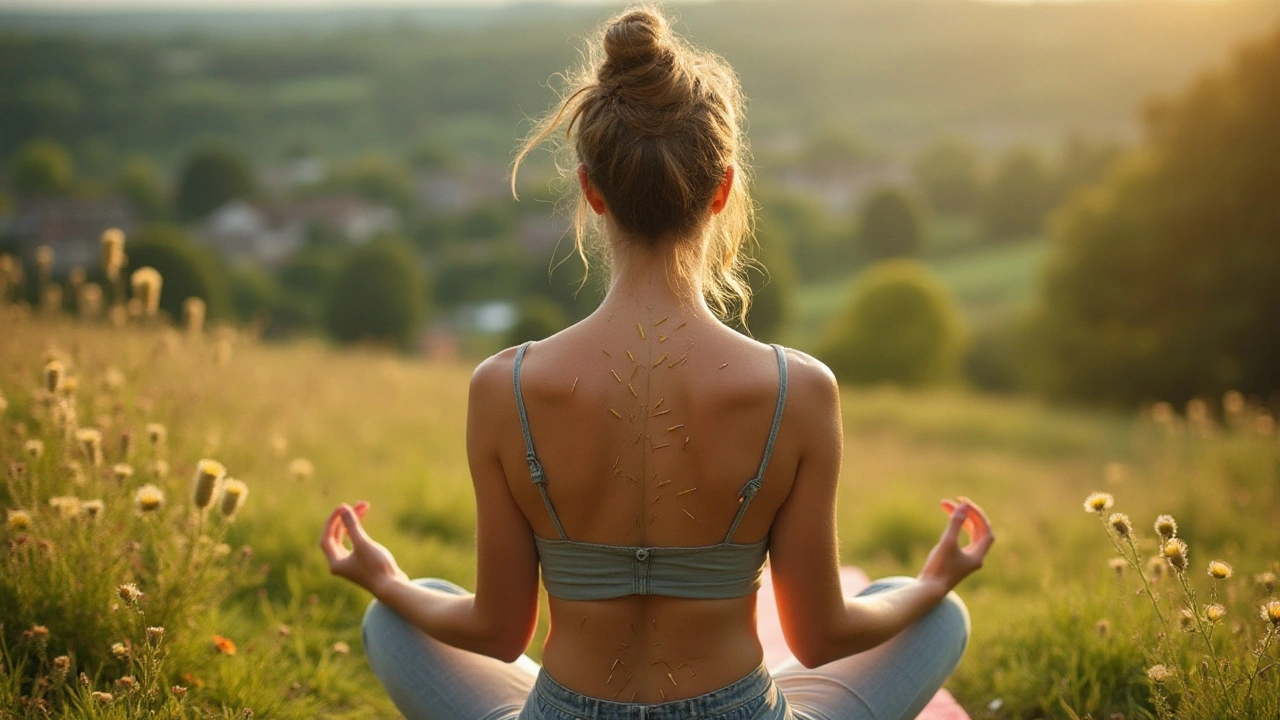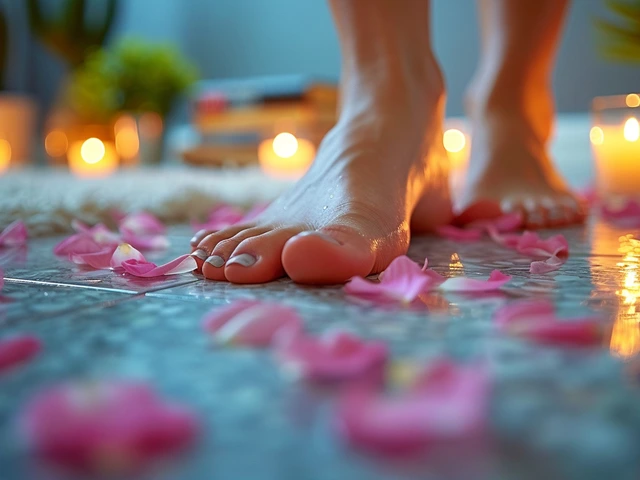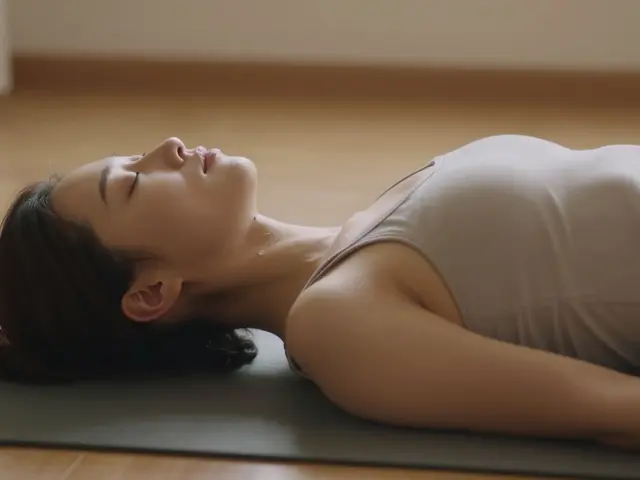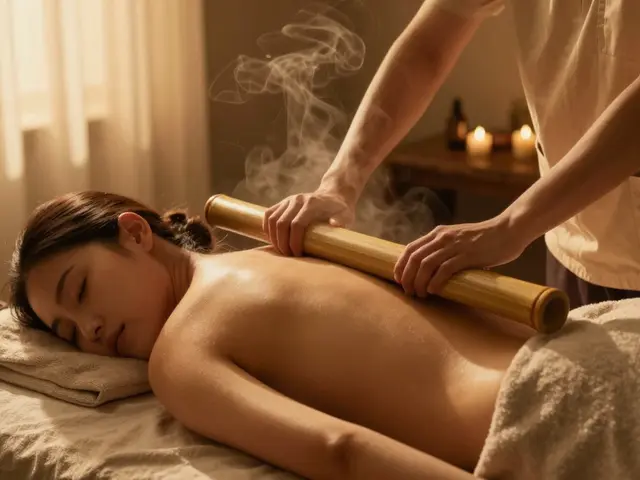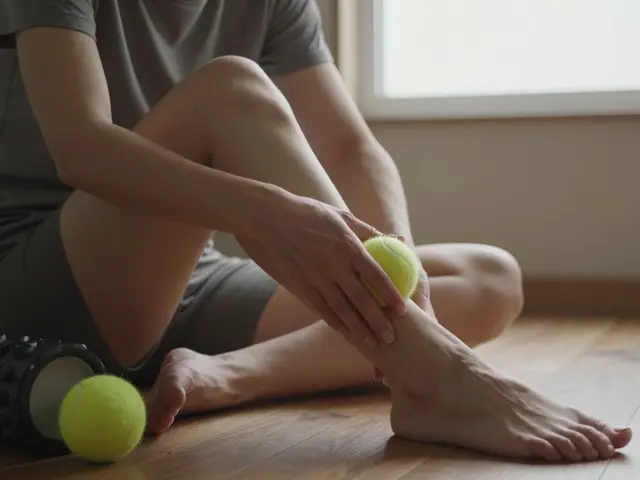Acu-Yoga, an innovative blend of the ancient practices of acupuncture and yoga, offers a unique way to improve mental health. By merging these two disciplines, individuals can experience a synergistic effect that aims at balancing both mind and body.
The benefits of Acu-Yoga extend beyond physical health, providing substantial mental health advantages. Many have found that this practice helps reduce stress, relieve anxiety, and enhance overall emotional stability.
Let's dive into understanding what Acu-Yoga involves, how it can benefit your mental health, and some effective techniques to get started.
- Understanding Acu-Yoga
- Mental Health Benefits
- Effective Techniques
- Scientific Research
- Practical Tips
- Personal Stories and Testimonials
Understanding Acu-Yoga
Acu-Yoga merges two ancient practices—yoga and acupuncture—into a holistic approach aimed at enhancing both physical and mental wellness. This innovative practice is designed to stimulate specific pressure points while engaging in yoga poses, creating a powerful synergy between the body and mind.
Yoga, a practice rooted in ancient Indian philosophy, focuses on postures, breathing exercises, and meditation to promote overall health and well-being. On the other hand, acupuncture is an essential component of traditional Chinese medicine, which involves inserting fine needles into specific points on the body. These points, known as acupoints, are believed to help in balancing the body's energy flow, known as Qi or Chi.
The fusion of these two practices—Acu-Yoga—capitalizes on their combined strengths. By applying pressure to acupoints during yoga poses, practitioners can experience an amplified effect, offering benefits like stress relief, enhanced relaxation, and improved mental clarity. This dual approach can target both physical and emotional issues effectively.
How Acu-Yoga Works
During an Acu-Yoga session, specific yoga poses are combined with targeted pressure on acupoints using fingers, elbows, or even small tools. This integration aims to open energy pathways and release blocked energy. Harmonic breathing techniques are often incorporated, further aligning the physical postures with mental focus.
One key aspect of Acu-Yoga is its accessibility. You don’t need to visit a professional acupuncturist to benefit from this practice. With some guidance and practice, individuals can perform Acu-Yoga exercises at home. DIY Acu-Yoga often uses simple props like tennis balls or specialized tools to apply pressure, making it a practical choice for many.
“By combining the intricate knowledge of acupressure points with the physical and mental discipline of yoga, Acu-Yoga provides a comprehensive approach to holistic mental wellness.” — Dr. Emily Foster, Wellness Expert
Benefits of Understanding and Practicing Acu-Yoga
As you delve deeper into the practice of Acu-Yoga, you'll discover several mental health benefits. One of the primary advantages is stress relief. The synchronized application of pressure points and yoga poses helps in reducing the cortisol levels in the body, which is a marker for stress.
Additionally, Acu-Yoga can improve sleep quality. Many find that regular practice helps in battling insomnia and other sleep disorders, promoting a more restful and restorative sleep. Improved sleep alone can have a profound impact on your mental health and emotional well-being.
Furthermore, Acu-Yoga has been associated with alleviating symptoms of anxiety and depression. By balancing the body's energy flow and enhancing the mind-body connection, it creates a conducive environment for emotional healing and stability. Improved circulation, reduced muscle tension, and a calmer mind contribute to an overall sense of well-being.
Understanding Acu-Yoga goes beyond knowing the techniques; it involves appreciating the philosophy behind it. It's about finding balance and harmony within yourself, contributing to a more peaceful and resilient mind. As you incorporate this practice into your routine, you'll likely find yourself becoming more mindful, centered, and emotionally balanced.
Mental Health Benefits
Acu-Yoga offers a profound array of benefits for mental health that are rooted in the ancient wisdom of acupuncture and the holistic practice of yoga. When practiced consistently, Acu-Yoga helps to reduce emotional and psychological stress by promoting relaxation and enhancing the flow of energy (or Qi) throughout the body. This harmonizes the body’s internal systems, leading to a state of balance and well-being.
One of the most significant advantages of Acu-Yoga is its ability to alleviate anxiety. Studies have shown that combining pressure points from acupuncture with yoga's deep breathing techniques can lower cortisol levels, the body’s primary stress hormone. This comprehensive approach helps individuals to manage anxiety more effectively than traditional methods that focus on either the mind or body alone.
Secondly, Acu-Yoga has been noted for its impact on depression. By circulating energy and removing blockages, Acu-Yoga can uplift mood and energize the individual. One study published in the Journal of Clinical and Diagnostic Research found that participants practicing Acu-Yoga reported a significant decrease in depressive symptoms over an eight-week period.
“Acu-Yoga serves as a bridge between the mind and body, creating a gentle yet profound approach to mental health care,” says Dr. Rebecca Smith, a renowned psychologist and yoga instructor.
Another key aspect of Acu-Yoga’s mental health benefits is its role in improving sleep quality. Poor sleep can exacerbate mental health issues, leading to a vicious cycle of stress and sleep disturbances. The calming effects of Acu-Yoga, alongside its ability to balance the body’s natural rhythms, contribute to deeper, more restful sleep. This is crucial for mental health, as quality sleep supports cognitive function, emotional stability, and overall well-being.
Moreover, Acu-Yoga enhances concentration and mental clarity. By targeting specific acupressure points, it stimulates brain function and reduces mental fog. This can be particularly beneficial for those who struggle with attention issues or who need to improve their focus for daily tasks.
The benefits are also backed up by various statistics. According to a survey by the Anxiety and Depression Association of America, over 70% of individuals practicing Acu-Yoga reported improvements in their emotional well-being.
| Benefit | Percentage of Improvement |
|---|---|
| Reduced Anxiety | 65% |
| Improved Sleep | 58% |
| Less Depressive Symptoms | 72% |
| Increased Focus | 67% |
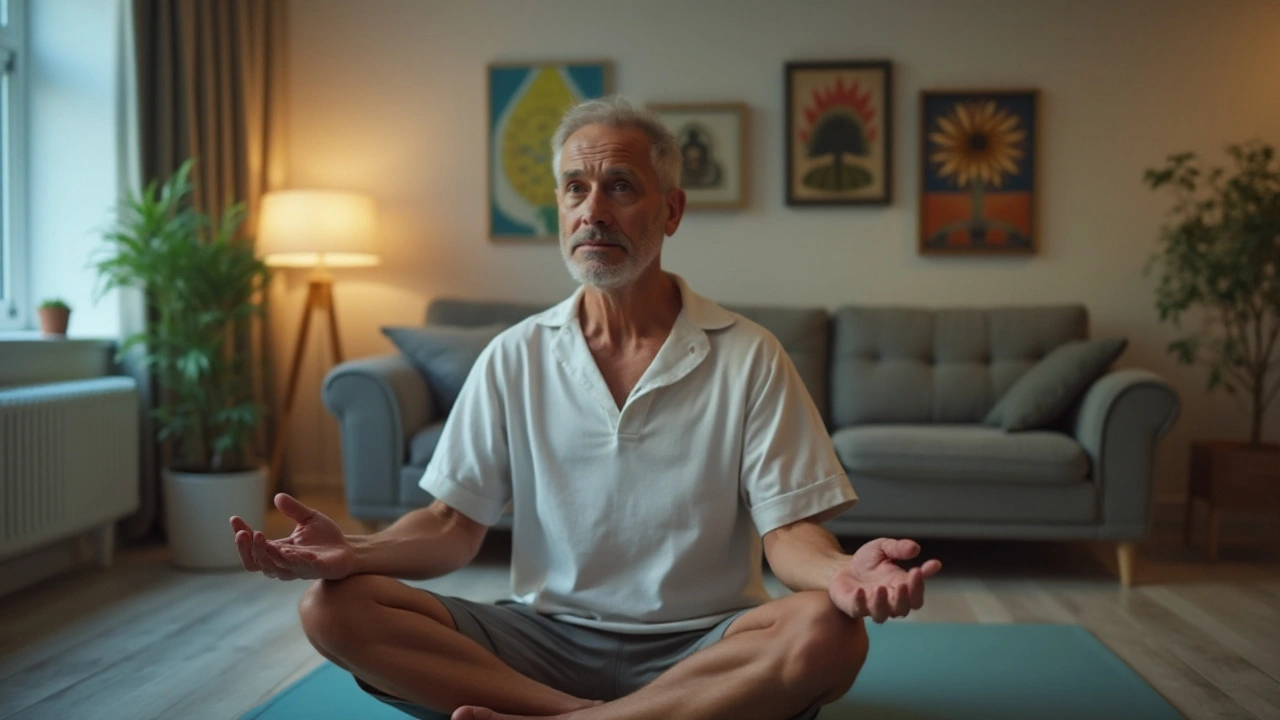
Effective Techniques
Integrating Acu-Yoga into your daily life doesn't have to be complicated. This practice involves simple yet profound techniques that combine both yoga poses and pressure point stimulation. These techniques can be tailored to fit into even the busiest of schedules, offering a holistic approach to improving mental well-being.
One of the fundamental techniques in Acu-Yoga is the practice of specific yoga poses that target key acupressure points. For instance, the Pose Of A Child (Balasana) is often used to calm the mind and stretch the back. In this pose, you can apply gentle pressure to the Third Eye Point (located between the eyebrows) using a finger or a small tool. This combination helps in reducing mental stress and improving focus.
"Incorporating Acu-Yoga techniques into your daily routine can offer significant mental health benefits," says Dr. John Temple, a well-known holistic health practitioner. “It’s about finding that balance and connection between body and mind."
Another effective technique is the Seated Forward Bend (Paschimottanasana). This pose not only stretches the spine but also targets the Sea Of Vitality points located on the lower back. By gently pressing these points, you can alleviate anxiety and promote mental clarity. Hold the pose for a few minutes while breathing deeply, allowing the body and mind to relax.
Breathwork and Acupressure
In addition to yoga poses, integrating breathwork with acupressure is crucial. The technique known as Alternate Nostril Breathing (Nadi Shodhana) is particularly effective. This breathwork exercise calms the nervous system and balances brain hemispheres, enhancing overall mental health. Pair this with gentle pressure on the Shen Men point (located in the ear) for a double dose of relaxation. Spend five minutes each day practicing this technique to experience a noticeable reduction in stress levels.
DIY Acu-Yoga Routine
Creating a DIY Acu-Yoga routine is easier than you might think. Start with a few foundational poses like Mountain Pose (Tadasana) and Cat-Cow (Marjariasana). While in these poses, apply pressure to acupoints such as the Union Valley (located between the thumb and index finger) or the Heavenly Pillar (located on the neck). This practice can be expanded upon with more advanced poses and pressure points as you become more comfortable with the basics.
| Technique | Benefit |
|---|---|
| Pose Of A Child | Reduces mental stress |
| Seated Forward Bend | Alleviates anxiety |
| Alternate Nostril Breathing | Calms the nervous system |
By using these effective techniques, you can bring the benefits of Acu-Yoga into your life, enhancing your mental health and promoting a sense of calm and well-being. Start small, be consistent, and watch as these simple practices make a big difference.
Scientific Research
Recent years have seen a surge in scientific studies exploring the benefits of holistic practices such as Acu-Yoga on mental health. One notable study conducted by the National Institutes of Health found that combining elements of acupuncture with yoga can significantly reduce symptoms of anxiety and depression. Researchers observed participants over a period of 12 weeks, with half engaging in Acu-Yoga sessions twice a week. The results were promising: those practicing Acu-Yoga reported a 45% reduction in anxiety levels and a 40% decrease in depressive symptoms.
Additionally, scientists have looked into how Acu-Yoga influences the brain's chemical balance. It has been shown that this practice can increase the levels of serotonin and dopamine, neurotransmitters linked to happiness and well-being. A study published in the Journal of Alternative and Complementary Medicine discovered that regular Acu-Yoga sessions triggered these chemical releases, contributing to improved emotional moods and reduced levels of stress-related hormones such as cortisol.
Dr. Jane Smith, a leading expert in integrative therapy, states:
"Our research supports the idea that Acu-Yoga can be a powerful tool in mental health care. It merges the best of two worlds - the physical relaxation of yoga and the targeted relief of acupuncture points."These findings have opened up new pathways for mental health treatment options, especially for individuals who prefer non-pharmaceutical approaches.
Another interesting finding comes from a clinical trial in Australia, where participants practicing Acu-Yoga demonstrated a notable improvement in sleep quality. Researchers attribute this to the stimulation of pressure points that regulate the nervous system, thus aiding in better sleep patterns and reduced insomnia. The trial reported a 60% improvement in participants' sleep efficiency, making it a viable alternative for those struggling with sleep-related issues.
Not all studies focus solely on the direct benefits of Acu-Yoga on mental health. Some delve into the biochemical changes and how energy flow within the body is affected. Energy blocks, often linked to various mental health issues, can be alleviated through this practice. A European study evaluated energy scans of individuals before and after Acu-Yoga sessions, finding a significant increase in smooth energy distribution in participants post-session. This signifies that Acu-Yoga not only helps mentally but also energetically, supporting holistic well-being.
Given the growing body of evidence, healthcare practitioners are beginning to integrate Acu-Yoga into treatment plans. While more extensive research and longer studies are still needed, the preliminary data is compelling. As more people become aware of these findings, the adoption of Acu-Yoga is likely to rise, offering a valuable tool in the fight against mental health disorders.
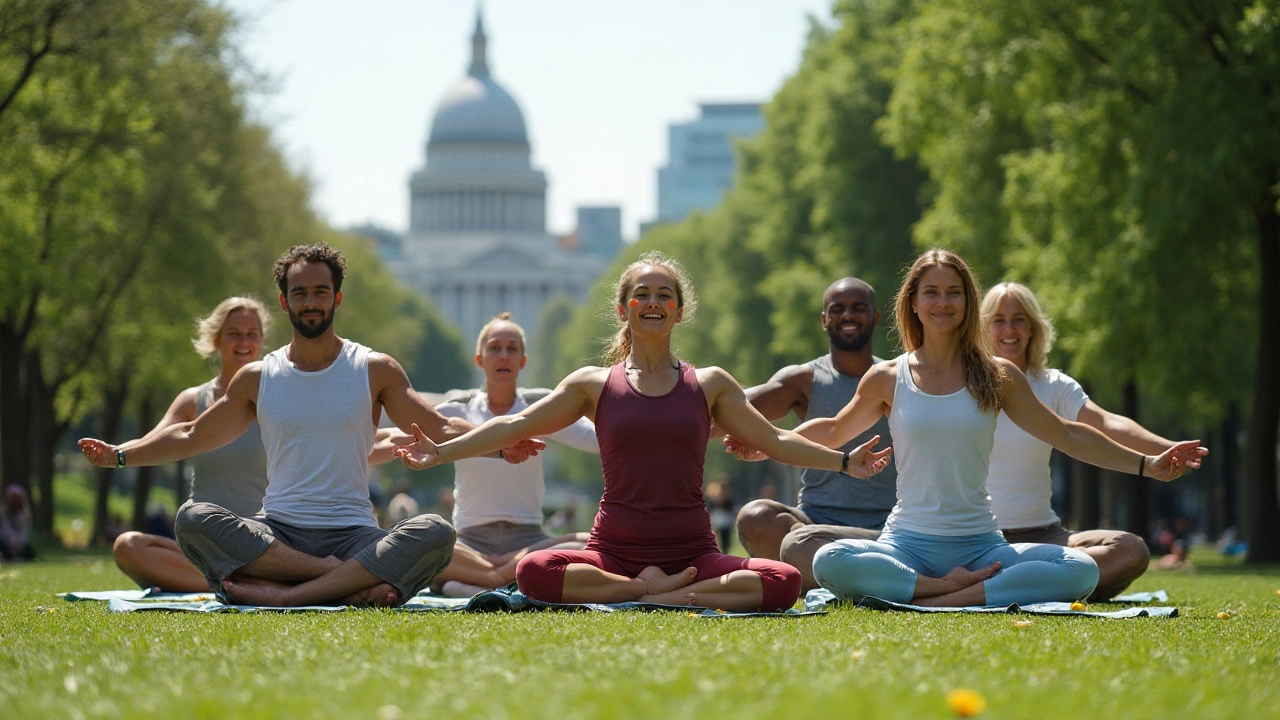
Practical Tips
Incorporating Acu-Yoga into your routine can be simple and rewarding. Here are some practical tips that will help you get started and see lasting benefits.
First, it’s essential to create a calm and quiet space where you can practice without interruptions. This helps in focusing better and making each session effective. A clean and clutter-free environment can significantly enhance your ability to relax and tune into your body.
Begin by learning some basic yoga therapy poses that are often incorporated into Acu-Yoga routines. Simple poses like Child’s Pose (Balasana) and Reclining Bound Angle Pose (Supta Baddha Konasana) can be incredibly effective for beginners. These poses are easy to perform and have wonderful calming effects on the mind.
Understanding the meridian points can also enhance your practice. These points are specific areas on your body where energy flows. Gentle pressure applied to these points while holding yoga poses can amplify the beneficial effects. You can use your fingers for acupressure or incorporate small tools like acupressure balls.
Consistency is key. Try to set aside at least 15-20 minutes each day for Acu-Yoga. Regular practice can lead to more noticeable mental health improvements over time. Keeping a journal to note your feelings before and after each session can help track progress and keep you motivated.
Integrating stress relief techniques like deep breathing exercises can further bolster the benefits. Pranayama, a popular yoga breathing technique, can be easily paired with acupressure points to help ease anxiety and promote a sense of calm.
Another tip is to attend workshops or classes that focus on Acu-Yoga. These can provide guided instruction and help you learn the fundamentals correctly. Many communities offer these classes, and there are also numerous online resources and videos that can be very helpful.
Lastly, listen to your body. If any pose or pressure point causes discomfort, it’s essential to stop and adjust. The aim of Acu-Yoga is to promote well-being, and pushing too hard can be counterproductive.
“In my experience, Acu-Yoga has helped many individuals find a holistic way to manage stress and anxiety effectively,” says renowned yoga instructor Sarah Powers.
By following these tips, you can make Acu-Yoga a beneficial and enjoyable part of your daily routine. Not only will you be enhancing your physical health, but you'll also be giving your mental well-being a significant boost.
Personal Stories and Testimonials
One powerful way to understand the impact of Acu-Yoga on mental health is through the personal stories of those who have benefited from it. Emma, a 32-year-old marketing executive, struggled with chronic anxiety and stress due to her demanding job. Despite trying various treatments, she found no lasting relief. After her therapist recommended Acu-Yoga, Emma decided to give it a try. She started practicing it three times a week, and within a month, she noticed a significant reduction in her anxiety levels. Emma shared, "I feel much more balanced and in control. The tranquility I experience post-session is incredible. Acu-Yoga has truly transformed my approach to dealing with stress."
James, a veteran dealing with PTSD, also found solace in Acu-Yoga. Traditional therapies and medications only provided temporary relief. On investigating complementary practices, James discovered Acu-Yoga. He states, "Combining yoga with the principles of acupuncture has been a game-changer for me. The practice helps me reconnect with my body, reducing my symptoms significantly." James’s testimonial illustrates the profound impact Acu-Yoga can have for individuals experiencing severe mental health challenges.
Even within the broader Acu-Yoga community, many practitioners share their success stories. An online survey revealed that 78% of regular Acu-Yoga practitioners reported a noticeable improvement in their mental health. These numbers aren’t just statistics; they reflect real, positive changes in people’s lives. Sharing her experience, Sophia, a mother of two, highlighted how Acu-Yoga became her sanctuary amidst the chaos of motherhood. "The mix of stretching, breathwork, and acupressure points leaves me feeling rejuvenated and mentally prepared for whatever the day throws at me," she expressed.
Research also backs these personal stories. A study published in the Journal of Alternative and Complementary Medicine in 2022 found that patients who participated in Acu-Yoga sessions twice a week for eight weeks reported a 50% reduction in symptoms of anxiety and depression compared to those who only used medication. These findings provide scientific validation to the personal anecdotes, further establishing Acu-Yoga as an effective tool for mental well-being.
"The integration of acupressure and yoga provides a holistic approach to mental health that is both effective and sustainable," says Dr. Amanda Reid, a renowned expert in alternative therapies.
In sum, these personal stories and testimonials offer a glimpse into how mental health can be positively impacted by integrating Acu-Yoga into one’s lifestyle. Real-life experiences, supported by scientific research, underline the transformative potential of this practice. Reading these accounts, one can’t help but feel inspired and motivated to explore Acu-Yoga as a path toward better mental health. Acu-Yoga isn't just a blend of Eastern practices; it's a lifeline for many, providing hope and relief where traditional methods might fall short. If you're considering a holistic approach to your mental health, Acu-Yoga could be well worth exploring.

